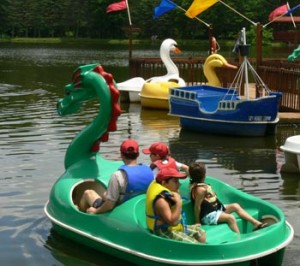|
|
July 29, 2013
 Hey dude. Welcome back. During the school year The Routine keeps the family on a short leash, jolting us into each day: “Get up or you’ll be late! Quit hogging the bathroom! Quit texting and finish your breakfast! Where’s your homework? Don’t forget your cleats! Get going!!”
Then summer comes. We exhale. We’re off leash. The voice inside our head takes a vacation and happily forgets to write. We feel free. And it dawns on us that, yes, we are human beings, not machines.
Hopefully every adult and child in your family had some special time during the break. Time together for fun and bonding. Time on alone for fun and self-discovery.
Now’s the time to get back in gear. It’s an adjustment for everyone. But for some kids going back to school is a real challenge, especially if last year wasn’t memorable in a good way. Maybe there was a personality clash with a “difficult” teacher. Or the (home)work repeatedly overwhelmed brain and emotions. Maybe there were issues with friends or ex-friends that made school a battlefield. If any of this happened to your kids, not surprising they don’t want to go back. But go they must.
So your job is to make it easier. Call a family meeting to debrief from last school year. Because let’s face it, not everything you and your kids did last term is worth replaying. It’s probably safe to say that a lot of what went down ought to be avoided. NOTE: I’m not implying that all the social garbage and arguments were intentional or avoidable, but I do know this:
1. It takes one person to start an argument. But it takes two people to keep it going.
2. Doing nothing in the face of a bad situation typically encourages more of the same.
3. People aren’t mind-readers. You’ve gotta tell them how you feel and actively teach them how to treat you.
4. Pain is part of life.
5. Suffering (blaming, feeling sorry for yourself, and/or rehashing) are optional.
So gather the troops for a safe and open conversation about what you each did (at home, at school, and online) that worked well last year and what didn’t. This may take 30 minutes, give or take, so schedule accordingly. If you blow off the family meeting rules (no interrupting, no invalidating, etc.) it’ll take longer and accomplish much less. More tips for a successful family meeting:
- Turn off all digital devices.
- Insist on respectful listening. Model it too.
- Bring snacks.
- Appoint a “secretary” to record new family agreements and policy. That way later, no one can get away with “I/You never said that!”
- Meet together regularly for progress reports. Celebrate what’s working. Tweak what isn’t.
Working together, as a family, you can contribute to a better school year for your kids and yourself. Good luck!
In friendship,
Annie
PS I’ll be writing more about Back-to-School challenges in the coming days. Stay tuned.

July 12, 2013
 There's nothing to do! (and it's all your fault) It’s July. Likely the summer doldrums have already moved in. Maybe you’ve already been accosted by your kids’ complaining, “Mom, I’m bored!” in that grating tone they use to let you know you’re failing as a parent.
I didn’t hear “I’m bored” very often from either of my kids. They’re adults now, both professional writers and both comedy improv performers. No lack of creativity there. But my son, now 6’1″ was always a ravenous boy. From him I often heard “Mom, I’m hungry!” His assumption: it was my job to feed him even when was old enough to take or make his own snack. Solution: I taught him to cook. Which he still enjoys and is very good at.
When we don’t let kids experience lulls in “fun time,” when Mom or Dad automatically become The Entertainer, kids are less likely to teach themselves to push through boredom and make their own fun. If we teach kids that it’s our job to do for everything for them, why should they bother learning to be creative? Why should they even bother thinking about what they might enjoy doing?
Summer can feel especially long when every moment of every day is unstructured. But a long summer can be such a gift to the imagination and the spirit. Here are some tips for helping your kids learn to banish boredom and get inspired!
1. Lead by example. There are things you love to do that tap into your creativity and stimulate your imagination. When kids see us being creative and fully involved in a project, they get the message, “In this family we put our imagination to work. And look how much fun and satisfaction we get!”
2. Talk about process. Being creative is often about experimentation and process more than product. When you catch your child in the act of doing something creative let him or her know that you admire their choice of activity. (Don’t worry about the mess!) If they produce a “product,” a drawing, a song, a dance, a video, a dozen cookies, a bird house, a garden, a lemonade stand, or a philanthropic campaign, then ask your child about the experience. How did you do that? What inspired you? How’d you feel while you were in the middle of it? What’d you learn? What would you do differently next time? What are you planning next? etc. These conversations inspire kids to continue being creative.
3. Unplug. With so much unstructured time, plugging in to a game, an app, or Social Media is an easy fix for “I’m bored!” But it’s also a time-sink and it’s not likely to teach your kids anything about their true passions, interests, and creative strengths. Family vacations are a great time to unplug. Sure it’s easier if you’re off the grid, but guess what? Even if you’ve got access, every digital device has a POWER-OFF switch. (Who knew?) Model self-discipline with your own devices. Show your kids what an imaginative adult looks like. Use family vacations to be with the family and play together in new creative ways.
It’s summer. Have fun as a family and show your kids how to do it on their own.

July 9, 2013
 Let's ride across the lake on a dragon! Right before the light turned green I glanced out my window and saw a four-year-old swinging in front of her house. Lucky girl with parents cool enough to tie that swing on the tree. Smiling, I remembered the endless freedom of summer days with no particular place to go. Then the light turned and off I went, back into adulthood.
Summer is a portal to the land of “Who Knows Where Until You’re There.” It’s also a golden pass from the scheduling gods. (Or it should be.) Because, let’s face it, time away from routine provides the breather we all need to step back, relax, try something different, have fun, and then return to “normal life” with renewed interest and energy.
As a kid in summer, I planned my own days, each one radiating endless possibilities. In September, my new level of self-reliance stayed with me, propelling me into a new school year. Summer holds that potential for every kid, provided (s)he has the freedom and time. But that doesn’t mean vacationing kids should veg out for days in front of one screen or another. That’s as unhealthy as corralling them into daily math & reading drills. Please don’t do either. But please do encourage fun and learning.
Let’s define terms. Learning is anything that exposes kids to new ideas, stretches the mind, promotes new ways of thinking, builds skills and knowledge, and/or encourages creativity. Summer can be a wonderful time for all sorts of special learning experiences. And because most parents are also “on break” during parts of the summer, families can learn together. Here are a few tips to make fun and learning part of this summer:
1. Call a family meeting. Discuss special projects and activities the family can take on during the summer. Let kids take the lead but you should also bring some ideas to the table by first checking the Events section of your local newspaper, your town website, or search for “Summer Activities for Kids and Families (your city name).” Educational/cultural institutions have plenty of program offerings. Find out what’s available, talk it up to your kids, and take part.
2. Be creative. Don’t let the close of school close the mind. Since many schools have cut out creative arts, summer is a great time to bring back those opportunities. Make arts and crafts. Make music and home videos. Make food and share the delicious goodies with your neighbors. When you do that, you’re also teaching generosity.
3. Have an adventure. Gorgeous weather is a terrible thing to waste. Seize the day and tap into a child’s natural desire for adventure. Unfortunately, many kids only satisfy this by playing computer games. But real trails, parks, streams, and shorelines are out there waiting for young adventurers. Google “Hiking (your city name)” and discover nearby natural environments for your family to explore. Print out maps before you go and let the kids help navigate.
4. Visit your public library. (We remember books, don’t we?) Ask a librarian for recommendations or better yet, have your children talk to the librarian about the kind of books they enjoy. Gather the family together each evening for a story or chapter or two. (Here are some free classic fairytales to get you and the kids in the mood.) Whatever you’re reading, talk about the use of language, characters, and plot points. Rather tell stories than read them? Here are some storytelling tips from a master.
5. Watch classic films. Summer themed or otherwise, a great film is a treasure trove of educational possibilities. Share some of your favorite films from childhood and let your kids choose their favorites. Discover new ones, including kid-friendly foreign films. Make popcorn! Snuggle! Critique the films! It’s all learning, as in learning what it feels like to be part of a loving family. (How else will your children be able to re-create this sense of “us-together” for their own kids some day?)
Twenty-first century childhoods are different from the ones we had. Yet, summer still has the power to inspire dreaming. During the school year, our kids carry a lot on their shoulders and in their psyches. They need down time. You do too. When we use summer to play with our kids and engage in creative, thoughtful activities, we strengthen family bonds and instill in children the love of learning. If not now, when? Try taking it a little easier this summer and encourage your kids to do the same. When we slow down, and have no particular place to go, we meet new parts of ourselves.
Have a happy healthy and safe summer from my family to yours.

May 18, 2013
 "I just want this to stop! But I don't know what to do." I originally wrote a version of this article for TakePart.com where I’ve contributed education posts. Check out the rest of my articles there.
My email from teens lessens on weekends. This may seem counter-intuitive since kids have more time to connect with friends. But school is where most of the social garbage gets dumped and spread around.
If you read your teen’s texts (I don’t recommend this unless you’ve got real cause for snooping. If not, please respect healthy boundaries.) you’ll mostly find innocuous blips of conversation. But sometimes your child’s circle of friends—and frenemies—can be intentionally cruel and toxic. That’s when parents need to be aware of what’s happening. Our job is to to help kids manage their intense emotions while teaching them appropriate ways to respond to friends who aren’t acting like friends.
Of course, many teens aren’t fans of sharing friendship issues with parents. They assume adult involvement will cause loss of computer and phone access. Or parents’ stepping in will just make things worse. Sometimes those fears are well placed, especially when adults don’t act responsibly. That’s why it’s important to know when and how to help a child who’s being harassed.
More: A Bully’s Paradise: Hidden Halls, Dark Corners and No Supervision
Here are some signs that your child may be having problems with peers. He/she:
- seems upset, anxious, or worried after reading text messages or spending time on social networking sites.
- gets defensive or clams up when you ask about school in general or about certain friendships.
- exhibits a change in appetite, sleep patterns, a dramatic dip in grades, a sudden reluctance to go to school, or a loss of interest in activities he/she previously enjoyed.
If you’ve been observing any of these signs over time, talk with your child, even if he/she insists that everything is “fine.” You know what fine looks like. If what you’re seeing doesn’t look fine, then trust your instincts—but don’t turn this into an interrogation. That will add stress and make it less likely that your child will want to talk to you.
Instead, you might begin the conversation with a straightforward observation. For example: “I’ve noticed that you seem upset whenever you come home from Emily’s house.” Then close your mouth, look into your child’s eyes with compassion, and listen. Hopefully, your calm, loving demeanor will (eventually) encourage your child to open up about what’s going on.
If other kids are targeting your child, be empathetic. Then find out what your child has already tried in an attempt to improve the situation. If he/she has not yet spoken directly to the aggressor, suggest it as an option. Teach your child to let others know that he/she deserves to be treated with respect. Tell your child that staying silent in the face of injustice rarely leads to more justice. On the other hand, when a formerly passive victim stands up for him/herself, the aggressor may realize they’ve been disrespectful. They may stop. Of course, sometimes it takes more than that.
If your child has delivered a clear message repeatedly and the harassment persists, it’s time to get the school involved. If your child wants to talk with an adult at school without your help, let him/her go for it. It’s great training for life. If your child would prefer for you to be there, then be there.
Before the meeting, check out BullyPolice.org and educate yourself on the anti-bullying legislation that exists at your state level. At the meeting, let your child take the lead when talking about his/her experience. Request to see a copy of the school district’s anti-bullying policy.
If the peer harassment persists, demand another meeting with the principal, yourself, and the parents of the child(ren) who has been harassing your child. If the principal and/or the other kids’ parents are unconcerned (“It’s just kid stuff”) or if you feel like you’re getting a runaround (“We’ll work on it”), don’t waste your breath. Go over the principal’s head to the superintendent. Name names. Be a pain. Do not allow yourself to be silenced. Do not stop the pressure until the harassment stops.
Every school has a legal and moral responsibility to make sure that all students are treated with respect at all times. When parents hold schools accountable, schools are more likely to do their job well.
 — Older Posts »
| |















